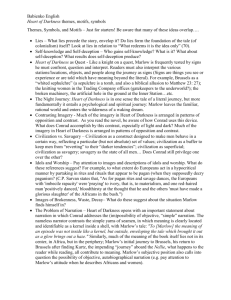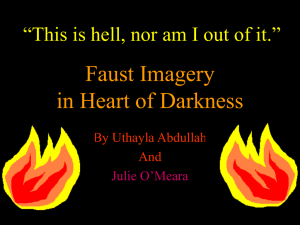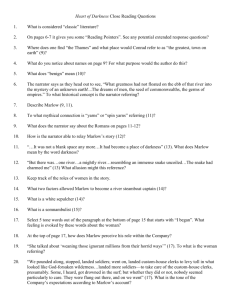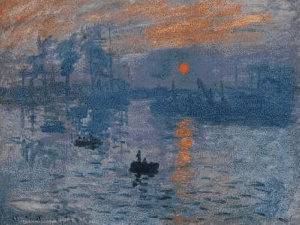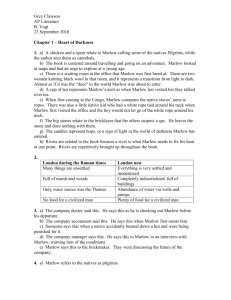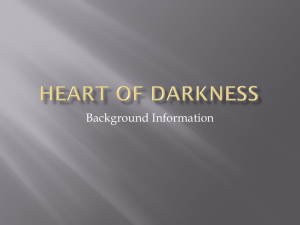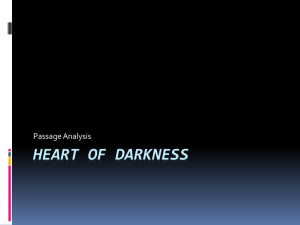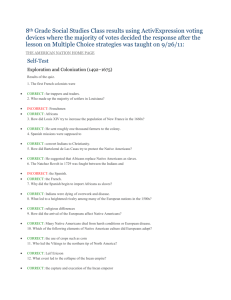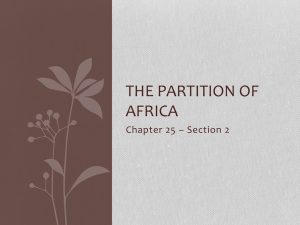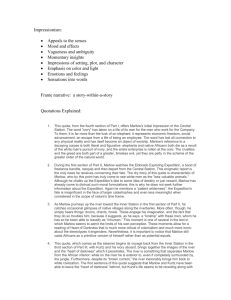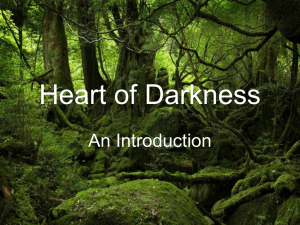HOD ideas - jessbarga
advertisement
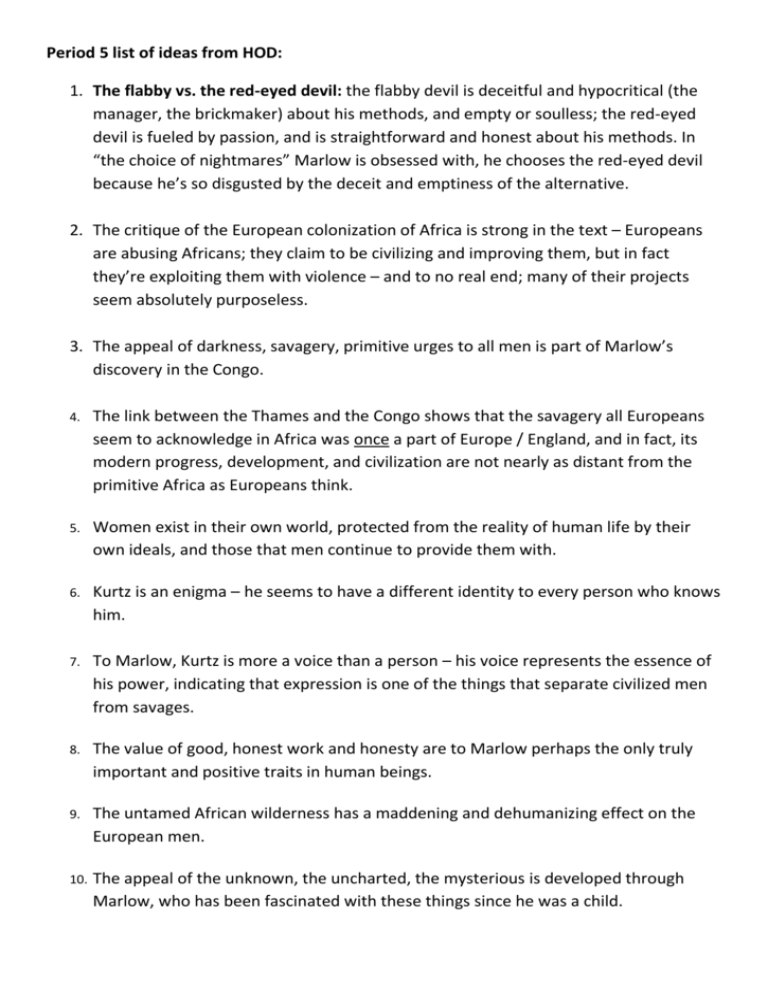
Period 5 list of ideas from HOD: 1. The flabby vs. the red-eyed devil: the flabby devil is deceitful and hypocritical (the manager, the brickmaker) about his methods, and empty or soulless; the red-eyed devil is fueled by passion, and is straightforward and honest about his methods. In “the choice of nightmares” Marlow is obsessed with, he chooses the red-eyed devil because he’s so disgusted by the deceit and emptiness of the alternative. 2. The critique of the European colonization of Africa is strong in the text – Europeans are abusing Africans; they claim to be civilizing and improving them, but in fact they’re exploiting them with violence – and to no real end; many of their projects seem absolutely purposeless. 3. The appeal of darkness, savagery, primitive urges to all men is part of Marlow’s discovery in the Congo. 4. The link between the Thames and the Congo shows that the savagery all Europeans seem to acknowledge in Africa was once a part of Europe / England, and in fact, its modern progress, development, and civilization are not nearly as distant from the primitive Africa as Europeans think. 5. Women exist in their own world, protected from the reality of human life by their own ideals, and those that men continue to provide them with. 6. Kurtz is an enigma – he seems to have a different identity to every person who knows him. 7. To Marlow, Kurtz is more a voice than a person – his voice represents the essence of his power, indicating that expression is one of the things that separate civilized men from savages. 8. The value of good, honest work and honesty are to Marlow perhaps the only truly important and positive traits in human beings. 9. The untamed African wilderness has a maddening and dehumanizing effect on the European men. 10. The appeal of the unknown, the uncharted, the mysterious is developed through Marlow, who has been fascinated with these things since he was a child. 11. The journey upriver is often referred to as a trip back in time: Marlow sees the Africans and their land as a Period 8 list of ideas from HOD: 1. The hypocrisy of the European imperialistic colonization of Africa – Marlow (and probably Conrad) is very critical of the way the Europeans say they are going to Africa to edify the natives, to bring civilization to savages, to spread Christian values and modern ways – when in reality, they’re going to exploit the ivory and other resources. 2. The red eyed vs. the flabby devil: Marlow seems to believe that sin is better when it is direct, intentional, and fueled by passion, rather than hidden in deceit, denial, selfglory, etc. 3. The dark heart that tempts all men – all people have an innate desire to cross over to the dark side. This is represented in the text by the journey upriver, and also by the kinship between Marlow and Kurtz, who may be two sides of the same individual. 4. The dark, untamed African wilderness activates the evil or savagery in men. Madness is the result of being exposed to such an unfathomable, unfriendly environment. 5. Women are pure – they should remain ignorant of the realities men face, and live in their own idealized world. However, some women in the text do wield power, such as the “Fates” (weaving women in black at the Brussels office), and Marlow’s aunt. 6. The African land is enigmatic, and signifies a regression to a primitive, primordial state of prehistory. 7. Likewise, civilization seems to be acknowledged as an advancement for humankind, but is also deeply critiqued as flimsy and flawed in many ways. 8. Light and darkness are utilized at first to show good vs. evil, but later in the text they are intertwined to show the contradiction between conventional systems of morality & good and evil (i.e., the European ones), and truth. Moral relativity is part of the subtext of HOD. 9. Race is important throughout the text – sometimes this is developed through the kinship between native Africans and Europeans; sometimes this is reversed so that native Africans seem more like animals than people. 10.Power, and the lengths to which men will go to obtain it, is an important idea – the employees of the Company seem to be constantly vying to advance up the ladder and amass power for themselves. 11.The appeal of exploration of the unknown – this is a two-sided issue because sometimes the unknown (or untamed) seems to reject or destroy the civilized explorers. 12.The link between the Thames and the Congo shows on one hand a contrast, by which the Thames and England represent modernity, civilization, progress, and order and the Congo represents primitivism, savagery, and mystery – BUT the time of darkness for England was “yesterday” – very recently, the Thames was just as savage as the Congo, and could easily be again. 13.It seems that to Marlow, the only real and legitimate values that exist are those of honesty and hard work. He’s most offended by the absurdity and futility of all the endeavors in which the Africans are engaged.

